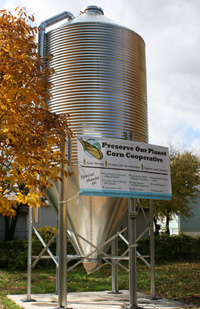
 |

|

By LINDSAY GSELL
Capital News Service
Friday, November 13, 2009
MOUNT RANIER - On a brisk fall night here, Brent Bolin fires up his corn-burning stove.
"It's great you can have some heat while you're sitting in your living room or doing whatever," said the 33-year-old National Institutes of Health employee. "It's a cozy, nice thing to have."
Bolin is one of several dozen Mt. Rainier-area residents using corn to heat all or part of a home. And he's one of nearly 70 members of Save Our Sky and Protect Our Planet, sister-home-heating cooperatives in Takoma Park and Mt. Rainier providing access to shelled feed corn for their stoves through urban grain bins.
The co-ops have been gaining in popularity. Since its opening in 2002, the Takoma Park co-op has gained around 10 new members a year, said Sat Jiwan Ikle-Khalsa, president of the sister co-ops.
The opening of the newest bin, in Mt. Rainier, was celebrated last month, seven years after the opening of the Takoma Park bin. The bins mean co-op members can avoid the drive to Mt. Airy where a local farmer grows the corn using sustainable methods.
Members say corn stoves are an eco-friendly way to heat homes by reducing gas, electricity or oil use, thus reducing the amount of greenhouse gases a home emits. The stoves are fueled by grain corn -- a tough corn typically used for feeding livestock. Kernels are dropped into the furnace to feed a flame, much like a pellet stove.
Most corn stoves can be vented directly out an exterior wall, so a chimney isn't necessary.
Ikle-Khalsa said burning corn releases no more carbon dioxide than is absorbed while growing, preventing excess greenhouse gases from being released. And unlike fossil fuels, corn is a renewable resource -- and one grown by a local farmer using sustainable methods.
With co-op members using anywhere from two to four tons of corn a season, their corn supplies must be replenished often. Members can drive up to a bin, fill their car with anywhere from 10 to 20 five-gallon buckets of corn -- enough to last one or two weeks, depending on the home -- and pay as they go.
While some co-op members use corn as a primary heat source, others use it just for hard-to-reach areas of the house, as does Protect Our Planet co-op member Bolin. Bolin found his older home's heating system was expensive and unreliable. When he heard about the Mt. Rainier bin being built, he began researching corn stoves.
"Once we realized we were going to be able to pick this stuff up two blocks from our house, it seemed like a really great idea," he said.
Bolin still sometimes runs boiler heat in his home during winter, but finds that the corn stove is enough to get by on autumn nights.
Co-op members pay a $100 initial fee and a $25 renewal fee each year thereafter. Members make a deposit at the beginning of the season based on how much corn they expect to use and draw from this amount as they refill their supply.
Primary heating with corn costs members between $500 and $1,000 a season, several hundred dollars less than a standard heating bill, said Ikle-Khalsa. These savings allow members to pay off the cost of their stoves -- which retail from $1,500 to $4,000, depending on size -- in roughly five years.
More than 20 states now boast corn stove manufacturers.
Despite favorable reviews from co-op members, Associate Professor Robert J. Kratochvil, who specializes in agronomic crop production at the University of Maryland, College Park, doesn't see corn stove heating becoming a widespread trend within the foreseeable future. The availability and cost of the feed corn is too unpredictable for a large population, he said.
Kratochvil said he believes the stoves will be more popular in smaller niche communities -- like Takoma Park and Mt. Rainier -- that are at the forefront of eco-friendly living.
There is one other co-op in Maryland -- Baltimore Biomass -- but it functions without a bin.
Corn stoves have already made an impact on co-op members in Mt. Rainier.
"When you sit in front of your corn stove, it's like sitting in front of a fireplace," said Mt. Rainier co-op member JodiBeth McCain, who led the efforts to build the Mt. Rainier bin and now heats her home solely by corn stove.
"More than all those rational reasons -- world peace, good for the environment, great for our pocketbook -- it's also beautiful and feels wonderful to sit next to," she said. "I don't dread the coming of winter anymore."